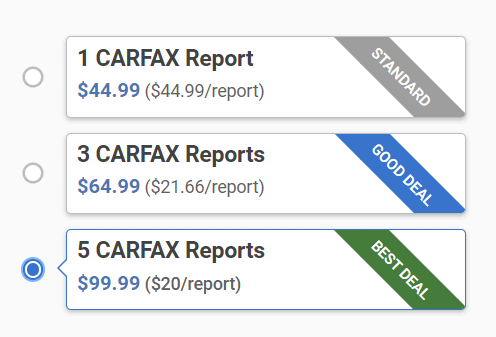Buying a used car? One of the smartest things you can do is check its vehicle history report. In fact, CARFAX reports that nearly 40% of used vehicles have been in an accident or sustained some form of damage—that’s about 110 million cars on the road today. With numbers like that, getting a reliable vehicle history report isn’t just helpful, it’s essential (source).
That’s where vehicle history services like CARFAX and AutoCheck come in. In 2025, there’s a clear winner. CARFAX is the better option, and here’s why.
1. CARFAX Has Built More Trust
CARFAX has become a trusted name in the auto industry for good reason. Its reports are clear, easy to understand, and loaded with detail. Instead of relying on a simplified AutoCheck Score, CARFAX tells the full story in a way everyday drivers can follow.
CARFAX pulls information from more than 100,000 sources, including insurance organizations, Collision Repair Shops, auto auctions, state DMV offices, and police departments. The result is a vehicle history dashboard with broader, more reliable vehicle history records than the AutoCheck database.
2. Deeper Coverage of Accidents and Damage
When it comes to accident history, CARFAX doesn’t just show you a number. It reports on damage severity, damage location, and even lists records of damage repair. It includes info about frame damage, airbag deployment, and vehicles that sustained flood damage.
CARFAX clearly identifies vehicles with a salvage title, branded title, or salvaged or rebuilt title. You’ll also find info about flood or lemon title risks—giving you context that can impact safety and resale value.
If you’re curious what functional damage means on a report, check out this guide on CARFAX functional damage.
3. Accurate Odometer and Mileage Checks
CARFAX is the gold standard for spotting odometer rollback and mileage discrepancies. It uses multiple sources—like safety inspections, oil changes, tire rotations, and mechanical services—to show the full picture over time.
AutoCheck’s simpler system doesn’t compare when it comes to catching mileage rollback fraud.
4. Title and Ownership Insights
You get complete ownership history, including how many previous owners there were, how long they kept the car, and how the vehicle was used. It includes usage and registration history across states and provinces.
CARFAX clearly lists title issues, with plain-language explanations for terms like branded titles, salvage title, and more.
You can also check out this guide on how to read a CARFAX report for a breakdown of what these terms mean.
5. Full Service and Recall History
CARFAX includes complete service records, tracking everything from brake rotor replacement to transmission replacement. It also pulls recall checks from auto manufacturers and the National Highway Traffic Safety Administration, so you know about any open recalls affecting the vehicle.
AutoCheck doesn’t offer the same depth when it comes to service history and recall transparency.
6. Clear Reports and Online Access
CARFAX makes it easy to understand even technical issues. Whether you’re checking from your desktop or on the go, the platform is accessible and simple to use.
It’s also integrated into major platforms like eBay Motors, Kelley Blue Book, and many used car listings, so reports are often included for free. AutoCheck has fewer integrations, which limits accessibility.
7. Better Value at CheapCarfax.net
While official CARFAX reports can cost $40 to $50, you can get the same CARFAX Report at CheapCarfax.net for just $5.99. It’s the best way to get detailed, reliable data without paying premium charges.
CARFAX provides more value per dollar, especially compared to reports from AutoCheck that may miss key details.
8. Trusted by Auto Professionals
CARFAX is preferred by auto industry professionals, automotive professionals, and used car dealers because of its depth, accuracy, and brand trust. It’s even offered as a dealer-only product and included in dealer services like Carfax for Life. The system fits into the dealer network, which helps with better transparency and builds buyer confidence.
9. Fast VIN Insights and Security
CARFAX uses the vehicle identification number (VIN) to decode vehicle specs, trim, and features. It even gives insight into paint thickness, leak down, compression test data, and prior mechanical inspection results.
Just enter the VIN, pay securely using any method, including Capital One, and receive your full report instantly.
If you’re new to VIN reports, this guide on how to decode a VIN number will walk you through it.
Is AutoCheck Reliable as Carfax?
When comparing AutoCheck and Carfax, both are reputable vehicle history report providers, but if you’re looking for a more comprehensive and trusted report, Carfax tends to have the upper hand.
Carfax is widely recognized in the automotive industry for its thorough and detailed reports. It draws data from a broader network of sources, including thousands of service shops, dealerships, and insurance companies, which often means you’re getting a more complete picture of a vehicle’s history. Its user interface is also more transparent and easier for the average car buyer to understand.
AutoCheck, on the other hand, is generally favored by dealerships due to its pricing model and strong auction data coverage, particularly from Manheim and Adesa auctions. While it’s useful for tracking auction history and scoring vehicles, it sometimes lacks the depth in service and ownership records that Carfax provides.
In short, AutoCheck is useful and budget-friendly, especially for dealerships or those buying multiple vehicles, but for most everyday buyers who want the most peace of mind and detailed information, Carfax is the more reliable and trustworthy option.
Final Thoughts: CARFAX Is the Clear Winner
When comparing CARFAX and AutoCheck, the difference is night and day. From detailed accident history and title history to real-world info like service records, recall checks, and ownership history, CARFAX simply gives you more to go on.
And with affordable, instant access through CheapCarfax.net, you don’t have to pay premium prices to protect your investment. Whether you’re a first-time buyer, dealership, or experienced VHR client, CARFAX delivers the data you need faster, cheaper, and with greater detail.
Don’t settle for missing info or vague scores. Go with the vehicle history tool trusted by the auto industry for decades, and make your next vehicle purchase smarter, safer, and stress-free.




